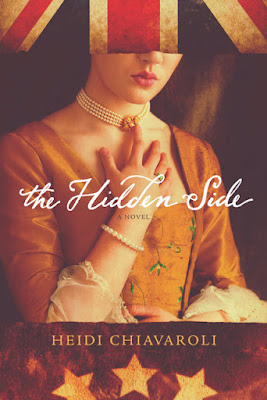As I read The Hidden Side that one last time, I couldn’t help remembering the frantic writing that came with being on deadline for my second novel. The idea for this story came late, and I was adamant about not asking for an extension on my deadline. So I wrote. And wrote. And wrote.
Truth be told, the emotional intensity of this novel, which involves a family’s worst nightmare in the form of a school shooting, helped me to write quickly. I was emotionally invested in the characters and I wanted to see their journey complete as quickly as possible.
Yet I was a bit crazy as I wrote. Entirely tied up in the story, I was so preoccupied with it I often felt only half-present with my family, even on the weekends. I was too busy writing to have much time for living.
This year, as I sat down to write my next novel on deadline, I again wondered how I’d accomplish it (and with a new novel being released in the midst of it all!). I didn’t want my life to be filled with constant seasons of craziness, as it seemed it might if I was going to continue in this publishing world. With that in mind, I forced myself to sit down, and get organized.
I took out my calendar and chose a date two months before my deadline to finish the story. (I wanted to leave ample time for edits.) Then I figured out how many words I would have to write, Monday through Friday, to accomplish this goal.
I cannot tell you how much freedom this gave me. To know that getting those 1,600 words in a day was my job—my responsibility—gave me immense liberty and released me from much stress. Once I completed my words each day, I was free to do chores or relax or read or whatever I needed to refuel my mind. And while my weekends weren’t completely free due to promotional efforts, they were lightened. I was living. Not just writing.
Two days ago I wrote THE END on my newest manuscript. I have two months to edit it before handing it in. This seems doable! I’m thinking I’ll stick with this method in the future. J
You know, this writing life is amazing. But it’s also often a wild, untamed thing. As creative people, we can be tempted to write only when the mood strikes us, or when we feel inspired. But as writers pursuing a serious career, we must set guidelines and get organized. A little bit of structure can provide a lot of freedom.
Do you give yourself a daily word count? How do you balance writing obligations with family obligations?
The Hidden Side:
New York — 2016
Every day Natalie Abbott offers sage advice to hurting listeners on her popular radio program. But away from the comfort of the studio, she struggles to connect with her family; with an out-of-control daughter and an uncommunicative and isolated son, Natalie takes solace in the daily woes of others, turning a blind eye to the pressing issues mounting at her doorstep. Her carefully constructed world implodes when a member of the family commits an unspeakable act. Known as the woman with all the answers, for the first time Natalie questions her way forward.
New York — 1776
Mercy Howard watches in abject horror as the man she loves, her fiancé Nathan Hale, is arrested and hanged as a spy. When asked to join the revolutionary spy ring in Manhattan, Mercy sees an opportunity to avenge Nathan’s death. But keeping her true loyalties hidden grows increasingly challenging as the charming Major John Andre of the King’s Army becomes more to her than a target for intelligence.
Mercy’s journals offer comfort to Natalie from across the centuries as both women struggle with their own secrets and well-kept shame—and wonder how deep God’s mercy truly extends.
Amazon Buy Link The Hidden Side
Heidi Chiavaroli began writing eleven years ago, just after Jesus had grabbed hold of her heart. She used her two small boys’ nap times to pursue what she thought at the time was a foolish dream. Despite a long road to publication, she hasn’t stopped writing since! Heidi won the 2014 ACFW Genesis contest in the historical category. Both her debut novel, Freedom’s Ring, and her sophomore novel, The Hidden Side, are 4½-star Romantic Times Top Picks. Freedom's Ring was also a Booklist Top Ten Romance Debut. Heidi loves exploring places that whisper of historical secrets, especially with her family. She loves running, hiking, baking, and dates with her high-school sweetheart and husband of fourteen years. Heidi makes her home in Massachusetts with her husband, two sons, and Howie, her standard poodle.
Links:
Website: www.heidichiavaroli.comFacebook: https://www.facebook.com/HeidiChiavaroli.Author/
Twitter: https://twitter.com/HeidiChiavaroli
Goodreads: https://www.goodreads.com/author/show/16080793.Heidi_Chiavaroli
Pinterest: https://www.pinterest.com/hchiavaroli/boards/
Instagram: https://www.instagram.com/heidichiavaroli/
BookBub: https://www.bookbub.com/authors/heidi-chiavaroli







